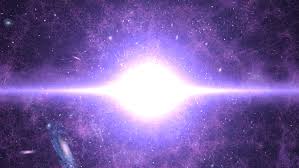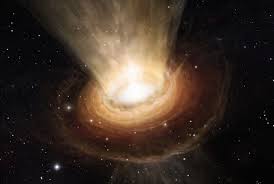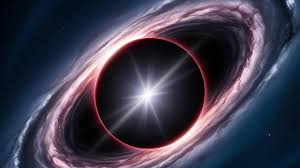Goodbye Big Bang? Scientist’s new claim – Our Universe was born from a Black Hole!
The origin of the Universe has always been a big mystery. Till now we have considered Big Bang Theory as the biggest explanation – a huge explosion that happened 13.8 billion years ago and after which the whole universe started expanding. But after new scientific discoveries, new questions are being raised about Big Bang theory. Some experts say that the universe may have started inside a black hole – and not from any huge explosion.

Breakdown of Big Bang Theory
Big Bang Theory says that the universe started with an infinitely small, dense singularity and then started expanding with a huge explosion. This theory explains cosmic microwave background radiation, distribution of galaxies, and expansion of the universe. This theory also gets a lot of support from Albert Einstein’s General Relativity.
But the problem starts from here – the concept of Big Bang singularity does not match with quantum physics. This theory also cannot clearly explain phenomena like dark matter and dark energy. And this is why many scientists are exploring new theories.
New theory of the universe: A new world inside a black hole
University of Portsmouth physicist Enrique Gaztañaga and his team have proposed a new and bold theory: could our universe have been created inside the black hole of a parent universe?
They say that if we look at the universe from the outside, it looks exactly like a black hole — a region with its own gravitational boundary. When a massive star collapses, a black hole is formed. Gaztañaga says that perhaps a similar collapse has happened in another universe, inside which our entire universe was created.
How was the theory tested?
This theory is not just an idea — the researchers carried out detailed simulations and calculations to test the concept. They found a solution that could explain current cosmological problems like dark energy and the Big Bang singularity without introducing any new particles or forces.

Surprisingly, they found an exact analytical solution — which shows that if certain specific conditions are met, the collapse does not end at the singularity, but rather there is a rebound. This rebound is followed by an expansion — which replicates an event like the Big Bang.
Does it also explain dark energy and dark matter?
Dark energy and dark matter are still the most mysterious things in the universe. Dark energy is believed to be responsible for the fast expansion of the universe, and dark matter for keeping the galaxies locked together. But both of them are invisible – we cannot detect them directly.
Gaztañaga’s theory says that we do not need new forces or exotic particles – the laws of gravity are enough. If the universe is created after the collapse of a black hole, then the expansion and large-scale structure can be explained by gravitational dynamics.
Einstein’s Theory and New Approach
Einstein’s general relativity says that mass and energy bend spacetime. This principle is responsible for the Earth’s orbit around the Sun. Gaztañaga says that if we apply this concept at the black hole level, it explains how the collapse of a black hole can become the beginning of a new universe.
He says:
“This is an alternate theory that fits more naturally, without any speculative element. We just used existing gravitational principles — and found the solution.”

Can we say goodbye to the Big Bang?
It would be too early to say that Big Bang theory is wrong. But it is certain that new observations and theories, such as Gaztañaga’s black hole universe concept, are forcing us to think in new dimensions. Perhaps the origin story of the universe is not as simple as we thought.
New perspectives and theories are always welcome in science – because they are what take research forward. Perhaps tomorrow we will see Big Bang theory as a stage – and the new black hole-origin theory as the foundation of a new cosmology.
Now the question is:
Is our universe inside some other universe?
Are we part of a cosmic cycle – in which every black hole gives birth to a new world? The answer may be found in the future – but for now, the origin of the universe has once again become a big mystery.
